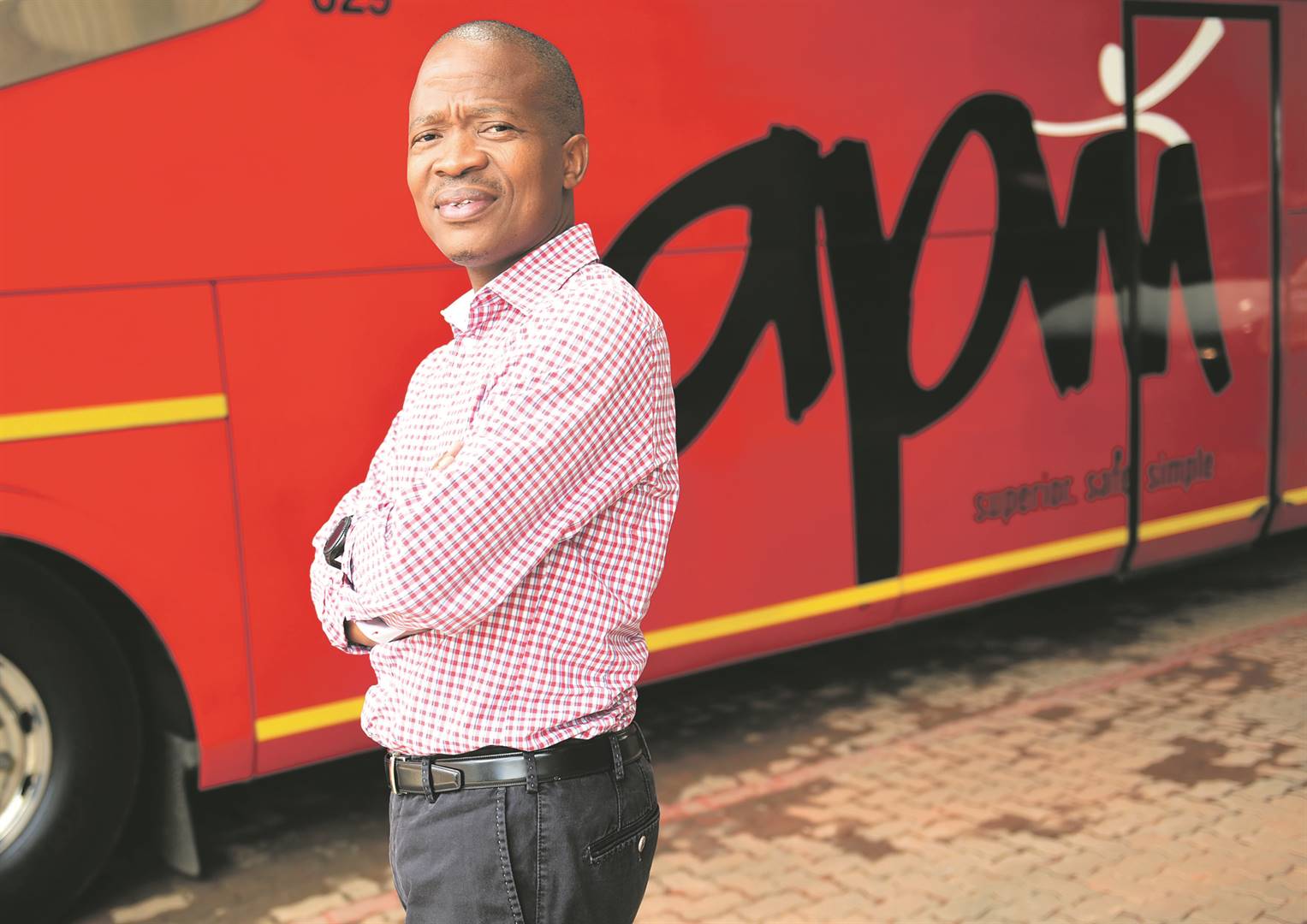
Tumisang Kgaboesele’s story chimes well with the idiom that one man’s loss is another man’s gain.
When he presented his turnaround plan to his employer and it was turned down, he didn’t realise it was not the end of the line, but rather the beginning of greater things to come.
Despite being a qualified lawyer, he founded the Pretoria-based Africa People Mover (APM) bus service, probably the biggest black-owned business of its type in the long-haul bus travel service. Kgaboesele and his company’s success is a good story to tell.
Who is Tumisang Kgaboesele?
Born in the Rustenburg area in North West, the 46-year-old Wits University law graduate went on to get his master’s degree in tax as he continued to climb the corporate ladder, however, his time spent at a public enterprise exposed him to public transport services.
Today, he is the CEO of APM and proudly identifies himself as an employee of his own company.
“Yes, I am currently employed as CEO of APM ... each morning, I come to work and, as soon as I go through the gates, I am an employee. I am not a shareholder who enjoys special status in the company; so I am subject to the policies of APM and don’t have more rights than any other employees,” he says.
“We have a properly constituted board that comprises independent directors, and I am subject to performance management by the board. I always tell staff that if I don’t perform, the board may decide that they’ve lost faith in me, and say: ‘Maybe you’ve run out of ideas and you need to step down.’ This is something I am always prepared for.”
Admitted as an attorney in 1999, Kgaboesele worked as an attorney at home and then in London for two years. He later went into the banking industry, joining Barclays for about three years.
“I was later recruited by Lucky Montana to be part of a team that founded the Passenger Rail Agency of SA [Prasa], and I worked on this project between 2007 and 2014. During my time there, I headed several divisions, including property, rail and Autopax, the bus service.”
How APM came out of a rejected plan
“In a strange way, APM was a turnaround plan for Autopax ... a plan I had submitted to the Autopax board at the time, saying that the business was just too cost heavy, over-capacitated in terms of assets [the buses] and had too many employees, which could not be justified at the time,” Kgaboesele says.
“To be relevant and to ensure long-term sustainability, somebody had to be bold and say we had too many people working there and too many assets that we were not utilising. One of the shocking statistics was that we had about 550 buses, but only about 250 were effectively utilised.”
He says he warned the company then that Autopax as a business was “not sustainable and, at some point, was going to run out of runway ... look at what is happening now and people are in denial”.
“Problems at Autopax are no different from what is happening at SAA, Telkom, the SABC and others – cost structures are unsustainable. There is just no way you can generate R10 a month but spend R20,” Kgaboesele says.
When his turnaround strategy was rejected, the highly ambitious and goal-driven Kgaboesele left Prasa.
The birth of APM
Having been at the helm of Autopax, Kgaboesele often sat at the same table as CEOs of other major national bus service operators in the country, including Intercape and Unitrans.
He says APM was born thanks to a “chance encounter” with Intercape CEO Johann Ferreira on a flight from South Africa to Los Angeles in the US.
“Ferreira wanted to find out what I had been busy with since I left Autopax and he made me an offer I could not refuse. He said: ‘What if I agreed to back you to start your own company? You have experience and surely you can put a team together ... I will put 49% into this entity and you’ll just need to get an operating licence and finance for coaches.’
“That is the offer he made and we signed a shareholders’ agreement. The real work started in June 2014, when we applied for the permit, put together a business plan and started looking for funders.”
Two years later in 2016 APM then became 100% black-owned after buying out InterCape.
Kgaboesele was starting the company from a zero base, and Standard Bank agreed to give him R26 million to buy six coaches, but there was a condition attached – he needed to have 10% of that to access the facility.
“This is when sefa [the small enterprise finance agency] came in and, with its R5 million, I managed to use R2.6 million to access the Standard Bank facility, and the rest was working capital,” he says.
APM was ready to hit the road, and Kgaboesele never looked back.
How sefa enables black businesses
Kgaboesele’s wish is to see more black-owned companies penetrate the industry.
“The most troubling thing is black participation ... 97% of long-distance passengers are black, yet you don’t have significant black operators. The reason you can’t get black businesses coming in is that the industry is capital intensive – the average price of a coach is R4 million.
“The minority still enjoys access to preferential finance and supplies. It is an uphill battle, and there is a need for things to be changed so that it possible for more people out there to participate.”
He says he was fortunate to have crossed paths with sefa.
“I have a soft spot for sefa and I am, in fact, in discussions for a second round of funding. There are no preconceived ideas about businesses at sefa, and the entity is extremely important to the economy. It’s doing its good work quietly, and I believe it will continue to create opportunities for potential businesses in South Africa,” he says.
Kgaboesele is today proud to say that his company is one of the best in the country and has managed to gradually penetrate the lower end of the market, providing a quality service for affordable fares.
There’s no such thing as an overnight success
He is thankful for his experience and exposure in the different sectors he has worked in.
Without the opportunity to head Autopax while with Prasa, he would not have been aware of the gap in the bus service sector, which led to his founding of APM.
“I always tell people that APM is not a five-year story, but a journey that was more than 20 years in the making because of my background and experience in law, banking and risk management, and knowing that a bank will never put money into a business it doesn’t think it will get its money out of. All these came together and helped build APM.”
An important thing he had to know and understand was his market.
“As a lawyer in an office in Sandton, you don’t get to interact with most people who use Metrorail trains, buses and taxis, but my work at Prasa allowed me to experience just how difficult it is for an average South African to travel between home and work, or between cities,” he says.
“I have walked in the shoes of my customers and I know what it means to be stranded and to miss an appointment, as well as how one feels when the bus fails to pitch. This is what is driving our performance – at the end of the day, it is our own brothers, sisters, mothers, fathers and uncles we are transporting, and we cannot afford to let them down.”
Success, challenges and APM’s vision
APM is now in the league of Autopax and Intercape, however, Kgaboesele says the past five years have been challenging – the past 18 months have been the “worst in our relatively young life” because the company had to retrench workers.
“This time last year, we had 220 full-time employees and we’re currently at 155. When our business model is fully funded and fully capacitated, we should have about 380 employees, but we’re halfway with that business plan,” Kgaboesele says.
He adds that he needs to motivate others, so he’s open about the fact that his company has recorded a turnover of R650 million over the past five years, which is “obviously half of what we thought we’d make”.
“From a zero base and five years later, we’re currently operating a fleet of 44 vehicles. Over that period, we have transported in excess of 1.6 million people.”
The company operates between Gauteng, the Western Cape, the Eastern Cape, KwaZulu-Natal and the Free State. Kgaboesele says that his growth plan is ambitious, but attainable.
“In a nutshell, if I had my magic wand, APM will be one of the three largest operators in the market when we turn 10.”
Finding sefa
1. The agency has 10 regional offices.
2. It has 38 core locations countrywide with other development finance institutions.
3. An app is being developed for entrepreneurs to easily access small business services.
4. Go to finfind.co.za
5. Go to sefa.org.za
Sponsored by sefa, a wholly-owned subsidiary of the IDC
| |||||||||||||
| |||||||||||||




 Publications
Publications
 Partners
Partners









